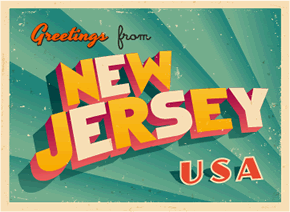History of PokerStars’ Involvement in New Jersey
For the better part of a decade, PokerStars dominated New Jersey’s online poker scene. Then Black Friday happened, and in one felt swoop the gaming behemoth’s presence in the Garden State, and the rest of the United Stated for that matter, went from omnipresent to virtually nonexistent.
Since then, PokerStars and its parent company the Rational Group have been plotting ways to reestablish themselves in New Jersey; this time in accordance with regulations dictated by the New Jersey Division of Gaming Enforcement (DGE). It’s been a tumultuous ride this far, but PokerStars is on the precipice of reemerging as a force in New Jersey’s soon-to-be regulated iGaming market.
PokerStars shows interest in purchasing Atlantic City Club
In July 2012, PokerStars agreed to pay $731 million to the U.S government to settle civil charges that the company violated the terms of the Unlawful Internet Gambling Enforcement Act (UIGEA). In exchange, PokerStars would be permitted to apply for gaming licenses in the United States, under either the PokerStars or newly purchased Full Tilt Poker brands. For PokerStars, forking over three-quarters of a billion dollars was seemingly a small price to pay for the prospect of reentering the massive U.S Internet gaming market.
Fast forward a few months and the gaming giant was already plotting its return to the US. In December 2012, two months before New Jersey officially legalized state regulated iGaming, PokerStars expressed interest in purchasing an old Atlantic City standby, the Atlantic City Club Casino (ACC), for $50 million. The plan was to buy the dilapidated casino on the cheap, and invest another $40 million into it over the course of five years, resurrecting it as a force within Atlantic City’s fragile gambling arena.
The Rational Group confirmed the purchase in January 2013; not for $50 million, but for a paltry $15 million. The company had until April 26th or the tentative deal would expire.
Rational goes to war with Colony Capital LLC
And expire it did. PokerStars inability to procure a temporary gaming license from state regulators ultimately killed the deal. The company was fully expecting to receive a decision from the DGE by April 24, but at the 11th hour sources claimed that it could take as long as August before regulators would make a decision regarding its fate.
According to State Senator Raymond Lesniak, a proponent of PokerStars and iGaming in general, “What I know is that the opponents of PokerStars are out there in full force trying to prevent them from operating in New Jersey.” It is widely believed that this opposition contributed to the failed purchase.
Despite the planned purchase falling through, PokerStars’ dealings with the Atlantic Club Casino were just getting started, only this time, the two weren’t exactly on cordial terms.
Knowing that the Rational Group would need to postpone the deal at least 90 days in order to procure a temporary license, Rational requested an extension. It was promptly denied.
In early May 2013 Rational filed a lawsuit against the ACC claiming that the casino acted in bad faith. It also sought a temporary restraining order that would prohibit the ACC from selling to any party other than Rational and would extend the terms of the Purchasing Agreement until the DGE’s review period of PokerStars concluded. The restraining order was immediately granted.
The lawsuit indicated that PokerStars paid the ACC over $11 million towards the purchase of the casino, and would be out another $4 million two days after the contract was terminated. In response to the pending lawsuit, representatives from the ACC and its owners Colony Capital responded that the plaintiff’s principles “were associated with serious criminal activities more extensive and unresolved than previously disclosed.”
PokerStars denied, turns to Resorts
Due to the original stipulations of the contract, a state Superior Court judge ruled in favor of the Atlantic Club Casino and Colony Capital LLC, stating that the expiration date of April 26 had already passed, and the ACC was within its right to terminate the contract. The Rational Group appealed the decision in mid-June 2013, but would ultimately abandon its efforts to purchase the ACC in July.
By then, the famed Internet company had already set its sites on another Altantic City relic. On July 3, merely two days after PokerStars’ appeal to reopen its bid on the Atlantic Club was denied, it reached an agreement to provide the platform for its popular brand of online poker in conjunction with Resorts Casino Hotel. Pending approval, PokerStars would be able to enter New Jersey’s iGaming market on the go-live date of November 26.
PokerStars plots its return
Three weeks later, PokerStars reached out to its former U.S. patrons via an emailed survey. In it, PokerStars asked for opinions regarding its brand, its sister-site Full Tilt Poker and state regulated gambling in general, likely in an attempt to determine which of its two sites would take center stage in the Garden State’s soon-to-be burgeoning iGaming market.
Then, in October, the company announced that it plans on building a $10 million dollar PokerStars branded poker room at AC Resorts. Currently owned by DGMB Casinos, and operated by the Mohegan Sun tribe, Resorts has not featured a live poker room since 2010. But thanks to its allegiance with PokerStars, a Resorts live poker room has at least the potential to rival Atlantic City’s most dominant poker host, the Borgata.
PokerStars has also exhibited a high degree of success tying its online brand to brick and mortar locales, as evident by the big turnouts for EPT and PCA tournament events.
Pokerstars waits for approval
There’s a distinct chance that all of PokerStars’ efforts to reinstate itself in the U.S will fall flat. The highly aggressive company has been regulated to playing the waiting game, as it cannot conduct gambling operations in NJ until it receives a gaming license from the DGE. To further complicate matters, Resorts Casino has not yet been approved for an Internet gambling permit.
Opinions are mixed on PokerStars’ chances of being awarded a license. Some believe that due to the privately owned company’s decision to ignore the UIGEA in 2006, it will be hard pressed to salvage its tarnished reputation. Others, Senator Lesniak among them, feel that PokerStars presence in the Garden State will be a determining factor in the state’s chances of succeeding in the newly-minted iGaming market. Lesniak recently went on record stating, “There are strong forces trying to prohibit them or at least keep them out of doing business for 3-to-5 years. I don’t think that’s in New Jersey’s best interests.”
While its generally believed that if PokerStars is granted a license it will be as widely successful in New Jersey as it is in the rest of the world, that’s a big “if.”






